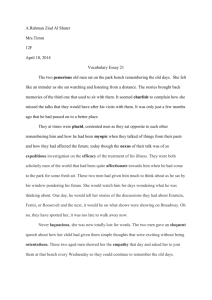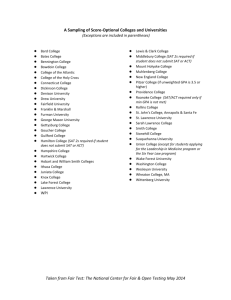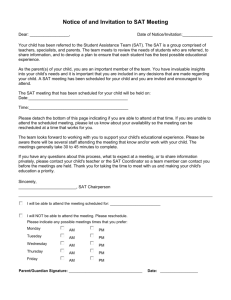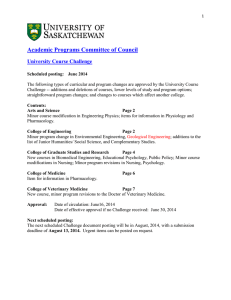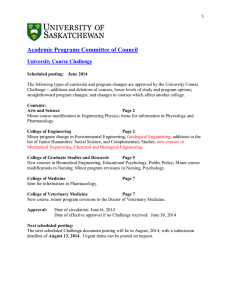Understanding Standardized Tests
advertisement
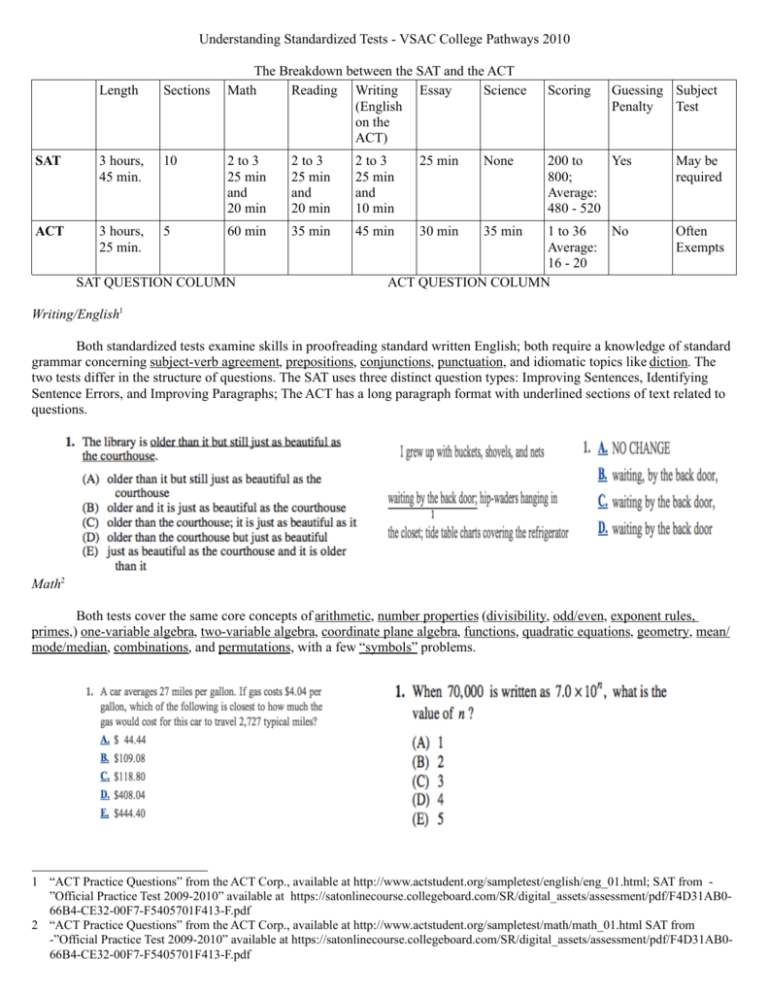
Understanding Standardized Tests - VSAC College Pathways 2010 The Breakdown between the SAT and the ACT Math Reading Writing Essay Science (English on the ACT) Length Sections SAT 3 hours, 45 min. 10 2 to 3 25 min and 20 min 2 to 3 25 min and 20 min 2 to 3 25 min and 10 min 25 min None ACT 3 hours, 25 min. 5 60 min 35 min 45 min 30 min 35 min SAT QUESTION COLUMN Scoring Guessing Subject Penalty Test 200 to Yes 800; Average: 480 - 520 1 to 36 Average: 16 - 20 ACT QUESTION COLUMN No May be required Often Exempts Writing/English1 Both standardized tests examine skills in proofreading standard written English; both require a knowledge of standard grammar concerning subject-verb agreement, prepositions, conjunctions, punctuation, and idiomatic topics like diction. The two tests differ in the structure of questions. The SAT uses three distinct question types: Improving Sentences, Identifying Sentence Errors, and Improving Paragraphs; The ACT has a long paragraph format with underlined sections of text related to questions. Math2 Both tests cover the same core concepts of arithmetic, number properties (divisibility, odd/even, exponent rules, primes,) one-variable algebra, two-variable algebra, coordinate plane algebra, functions, quadratic equations, geometry, mean/ mode/median, combinations, and permutations, with a few “symbols” problems. 1 “ACT Practice Questions” from the ACT Corp., available at http://www.actstudent.org/sampletest/english/eng_01.html; SAT from ”Official Practice Test 2009-2010” available at https://satonlinecourse.collegeboard.com/SR/digital_assets/assessment/pdf/F4D31AB066B4-CE32-00F7-F5405701F413-F.pdf 2 “ACT Practice Questions” from the ACT Corp., available at http://www.actstudent.org/sampletest/math/math_01.html SAT from -”Official Practice Test 2009-2010” available at https://satonlinecourse.collegeboard.com/SR/digital_assets/assessment/pdf/F4D31AB066B4-CE32-00F7-F5405701F413-F.pdf SAT QUESTION COLUMN ACT QUESTION COLUMN Essays3 Both tests offer an essay section. On the SAT, the essay is mandatory, while the ACT's essay is options but strongly recommended. It is recommended on both exams that you use a traditional 5-paragraph essay format consisting of athesis paragraph, three body/evidence paragraphs, and a conclusion paragraph. In addition, the ACT's format strongly rewards students who additionally include a rebuttal paragraph, addressing the opinion contrary to the student's thesis. On both exams, students are graded by two human readers, who are trained to look for a clear, consistent thesis, supported by evidence, in a clearly organized, generally grammar error-free format; think “good first draft” level of quality. However, given the limitations of the exam formats, neither test requires that evidence be factually accurate - students are not encouraged to make up facts, but they should worry more about having a clear thesis supported by facts as if they had been given time to research those facts. Furthermore, each body paragraph may concern different examples, or there may be one example for the entire essay; in each case, be sure to connect each paragraph to your thesis. Critical Reading4 Both tests examine a student's ability to read and understand material from prose sources from four content areas: prose fiction, humanities writing, social sciences writing, and physical sciences writing. On both exams, the general structure of the non-fiction passages tends to be thesis/opinion - evidence - counter-point - conclusion, with each paragraph having a similar structure; as such, the most important parts of each passage are the first and last sentences of the passage, followed by the first and last sentences of each paragraph. After that, individual details should simply be noted only to create a quick summary of each paragraphs' main idea; if a question asks for a detail, it will usually give the line reference. In the prose fiction passage, read the passage summarizing each paragraph or section of dialog, and then identify the narrator, each character, and their relationships to each other, followed by the opinions each character possesses. 3 “ACT Practice Questions” from the ACT Corp., available athttp://www.actstudent.org/writing/sample/index.html SAT from - ”Official Practice Test 2009-2010” available at https://satonlinecourse.collegeboard.com/SR/digital_assets/assessment/pdf/F4D31AB0-66B4CE32-00F7-F5405701F413-F.pdf 4 “ACT Practice Questions” from the ACT Corp., available athttp://www.actstudent.org/sampletest/reading/read_01.html SAT from ”Official Practice Test 2009-2010” available at https://satonlinecourse.collegeboard.com/SR/digital_assets/assessment/pdf/F4D31AB066B4-CE32-00F7-F5405701F413-F.pdf Exam Specific Questions5 SAT: Sentence Completions Only the SAT directly examines vocabulary skills, though both tests have vocabulary questions in reading passages, and generally require strong vocabulary skills in order to reach higher score results. In both direct sentence completion questions like this on the SAT, and on ones inside reading passages, try to fill in the blanks yourself the first time you encounter a sentence; then look at the answer choices, eliminate obviously wrong choices, then work through the words with which you are unfamiliar. Good resources to help you do this are to break the word into familiar syllables, or see if it looks like another word with which you are familiar, or if it looks like a word you know from French, Latin/Greek, Spanish, or (occasionally) German. ACT: Science Only the ACT directly examines scientific thinking skills. The ACT does not require that a student have taken any specific science courses before taking the exam; instead the ACT science section examines a student's ability to understand and apply the scientific method to various experiments, diagrams, and arguments. While this means that students who are careful thinkers can do very well without extensive science backgrounds, practice beforehand is highly recommended for the ACT Science, as even excellent science students can find themselves unpleasantly surprised by this section's short pacing. Miscellaneous Advice - Don't worry about re-taking either exam; due to the ways that these tests are often used in non-college based educational assessments, colleges always give students the benefit of the doubt in accepting multiple scores. - Always - always, always, always - take at least one practice test before the real thing; make sure you carefully read the directions, and that you feel familiar with the layout of the test itself. Ideally, you should take two tests, the first one untimed to allow yourself to read the directions and find out how familiar you are with the underlying concepts, and then one examination timed in order to see how the limitations of timing affect your score. Then you can either review the core concepts that are limiting your score, after which you can increase your speed by doing sets of questions under timed conditions. - No letter in the answers is more likely to be correct; this day, each letter is a correct answer as each other, so no just guessing “C”. Additionally, on the SAT, if you have no idea what the answer is, leave the question blank; on the ACT, leave a minute at the end of the exam to look over your answer sheet, decide which letter you have answered the least so far, and then guess that letter on each blank question. - Remember to consider the college to which you are applying; not every school needs a 700 or a 32 in order to get in the door; by far, most schools are perfectly happy with 450 or 17 across the board. However, some schools require not only the SAT or ACT, but either SAT subject tests, and are strongly recommending at least 3, if not more, Advanced Placement examination. - While practice does make perfect, generally just retaking standardized exams does not improve scores; if you are going to seek additional outside help for tutoring, make sure the weight of that tutoring is on the fundamental skills necessary 5 “ACT Practice Questions” from the ACT Corp., available at http://www.actstudent.org/sampletest/science/; SAT from - ”Official Practice Test 2009-2010” available at https://satonlinecourse.collegeboard.com/SR/digital_assets/assessment/pdf/F4D31AB0-66B4CE32-00F7-F5405701F413-F.pdf for the exam rather than focussing on particular “test prep strategies”, which often produce a good initial boost in scores, but then tend to peter out beyond the initial increase. Preparation Resources VSAC: Through VSAC, you can reach the SAT, ACT, AP, and ASVAB exam portals, in addition to VSAC resources, including Learning Express Advantage, which is a general resource center for all things exam related. VSAC Standardized test resources library: http://services.vsac.org/wps/wcm/connect/VSAC/vsac/library/pathfinders/vsac+-+library+-+pathfinders+-+testing LearningExpress: http://services.vsac.org/wps/wcm/connect/VSAC/vsac/plan+for+college Outside Resources: These are publicly available resources, but are not supported or affiliated with VSAC. General Resources: WikiBooks: An online repository of free open-source textbooks for reviewing content areas. www.wikibooks.org Kaplan Quiz Bank: Kaplan Test Prep offers an online database of SAT and ACT questions free with registration. A good way to quickly create self-tests on specific areas and problem types. http://www.kaptest.com/College/Home/quizbank.html Vocabulary Resources: Greek and Latin Roots: Wikipedia's list of greek and latin roots is extremely extensive, much more so than is often found in commercial test prep materials. http://en.wikipedia.org/wiki/Greek_and_Latin_roots_in_English Free Rice Charity Quiz: An online website that donates one grain of rice for each vocabulary question a student correctly answers. A good way to practice when you're sick of flash cards. www.Freerice.com Additionally, your school library and/or guidance office should have free practice tests, books, and additional printed resources. If you have special needs accommodations, be sure to talk to your guidance counsellor about exam modifications; both tests have alternative testing accommodations for students with additional learning needs.6 Finally, neither the SAT nor the ACT are the end-all and be-all of your admissions profile; nor are they IQ tests. They're standardized tests. They only test where you stand in comparison to everyone else who took that test that day, and if you don't do that well that day, you can take it again. And you shouldn't think that this is a barrier to college; most colleges are fine with an average score, and thousands of colleges don't even place any significant emphasis on the scores. Really, the SAT and the ACT are nothing more than an opportunity to finish off your college application with a score that shows you can generally handle college materials under pressure conditions, in addition to general school conditions. If you do well, great - if you don't you can do better. Just take some time, figure out where you want to go, and then plan some time to practice. 6 All questions used in this document are questions obtained from documents made public for educational purposes, and remain the copyright of their respective owners. This document was prepared for VSAC College Pathways 2010 and intended for one-time nonprofit educational exhibition. Thanks for reading this disclaimer. Better safe than sorry.


